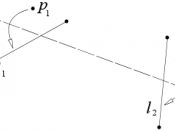"Ethical axioms are found and tested not very differently from the axioms of science. Truth is what stands the test of time."- Albert Einstein
First of all, we have to understand what exactly the term 'axiom' or saying is. Axioms are "self evident truths" or "universally accepted principles or rules." The first definition can be applied more closely to ethical axioms while the latter more closely to the scientific ones.
In this sense, an ethical axiom can be "It is wrong to take someone's life," and a scientific axiom can be "Every object continues in its state of rest or uniform speed in a straight line unless a force acts on it." The first example shows an obvious truth that is universally accepted by people with 'healthy' minds. This conclusion must have been reached like a scientific axiom -- by observation -- that is, by seeing that killing someone arouses strong emotions and counter actions in people related to the victim in some way.
A widely accepted test to see if an action is ethical is to try to see if one would like the same thing done to oneself. When this test is applied, the immorality of killing someone is supported. Now let's look at the example of a scientific axiom, called a law. It was stated that every object continues in its state of rest or uniform speed in a straight line unless a force acts on it. This example is known as Newton's first law of motion. This law has been reached through careful observation of objects in motion, and with the recognition of friction as a force. Recognition of friction is crucial since when friction is present, objects slow down and eventually stop. However, friction can be minimized for experimental purposes. A puck on a hockey...


